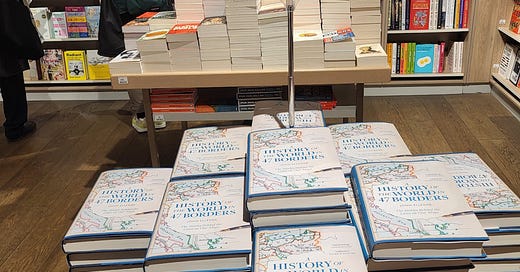My Much Anticipated 2024 Books of the Year Newsletter
Also this week: some notes on reindeer. But first: what is Keir Starmer playing at?
There are compelling arguments in favour of the British government’s plans for English1 local government reform, published, to limited fanfare, earlier this week. England is one of the most absurdly over centralised-countries in the developed world, with decisions taken over and financing provided for what should clearly be local matters by people in London who’ve never even visited the places they purport to govern. Devolution by default and multi-year funding settlements are better than making councils waste time and energy constantly bidding for the money and power to govern themselves; the larger units the plan proposes will be better placed to deliver the policies – housing, planning, infrastructure – required to drive growth and raise living standards. If delivered, this plan would mean a more rational, rules-based system than the current messy geography created by ministerial caprice. That’s without even getting into the fact that the existing system is teetering on bankruptcy.
There are compelling arguments against doing any of this, too. Reorganisations suck in both money and time, and given the state of everything it’s not obvious the government should be wasting either. Larger units may be more efficient, but they will also be more distant from the voters, which fits awkwardly with the promise of “devolution”, and also they might not actually be more efficient either. Worst of all, without genuine fiscal devolution of the sort the Treasury remains determined not to allow, it’s possible all this is a politically-ruinous deckchair rearranging exercise.
It is, in other words, a gamble. I’m broadly in favour, but it’s entirely possible it won’t pay off on an electorally-useful timescale, and the next wave of local government reorganisation will almost certainly be about how councils have all gotten too big again.
That, though, does not feel like the conversation we are having about all this. Instead, coverage is being shaped by existing councils saying it’s bad because it’ll mean the people running them lose their jobs, and while there may be political risk in alienating the activists who do much of the frontline campaigning in politics, that does not actually mean it’s not the right thing to do.
There are also people sniffily suggesting that, because there’s no public demand for such a move it is, ipso facto, pointless – as if the only reason to do anything is to attempt to plump the polls now, and that doing anything that might be termed “governing” is for wimps. Boris Johnson may have left office two years ago, but Johnsonism, the belief that governing is entirely a matter of chasing headlines and shaping a message rather than the boring, messy issues of actually running a country, still hangs over our politics like a bad smell.
Well: this might not work. It’ll take a lot of energy, and annoy a lot of people. Perhaps it will deliver. Perhaps it will not.
But the fact it will do nothing about the fact Keir Starmer’s Labour party is struggling in the polls has absolutely no bearing on whether or not this is a good idea, and not that much on whether it stands to lose an election that could still be 56 months away. Getting better at comms would help; so, I suspect, would his aides growing out of their apparently unquenchable urge to kick their own side. But ultimately the government’s fate will be dependent on two things: whether the global economy develops in a manner that reduces inflation and thus ends the incumbency curse, and whether it actually makes this country better.
Actually governing, in other words, is the best shot it has of surviving an electoral contest that may be more distant than the next US presidential. And if growth doesn’t pick up in a manner that can manifest in both fatter wallets and shorter NHS queues, then all the good headlines in the world won’t save Keir Starmer.
My books of the year(ish)
If you’re anything like me – and if you’re reading this newsletter, I bet you are, no matter how much you may wish to deny it – you probably buy a lot of books this time of year, and appreciate any last minute gift inspiration anyone has to offer. I’ve spent a lot of time bigging up my own book the last few months – I’m going to stop after Christmas, I swear, but look, I’ve got my own table at the big Foyles…
…but obviously you can’t buy that (from Stanfords, Waterstones, Foyles, Amazon or my American publisher, The Experiment) for everyone.2 And so, because I’ve enjoyed a lot of books this year, not all of them written by my mates – and because this newsletter likes to think of itself as the 5th emergency service – I hereby present:
***The Newsletter of (Not Quite) Everything Christmas Gift Guide***
(I’ve included one link for each – some of them are Amazon because even though they’re evil, they’re also of most use to an international readership – but they are of course all available from all the usual places you might buy books.)
Keep reading with a 7-day free trial
Subscribe to The Newsletter of (Not Quite) Everything to keep reading this post and get 7 days of free access to the full post archives.



